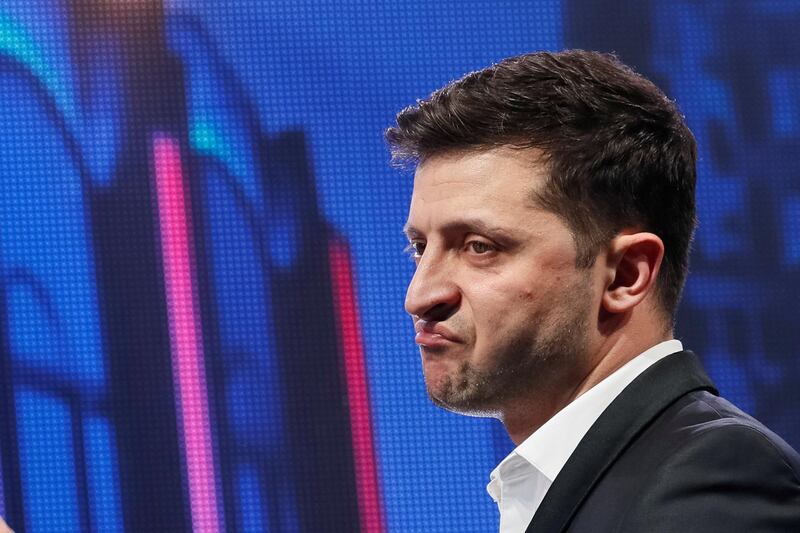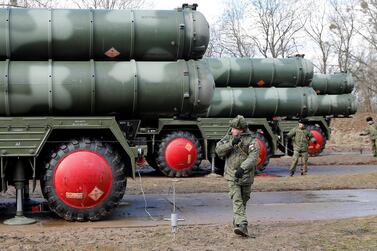Ukraine’s newly elected president, Volodymyr Zelenskiy, has not even taken office yet, but he is already facing his first test from his country’s biggest political rival next door: President Vladimir Putin of Russia.
Just three days after Mr Zelenskiy won a landslide share of the ballot in presidential elections on April 21, Mr Putin offered to all but hand out Russian passports to Ukrainians living in break-away republics along the border between the countries.
The rhetorical challenge over passports has sparked a bitter back and forth between the two leaders ahead of Mr Zelenskiy's inauguration on June 3.
After European leaders in Brussels and Washington DC criticised the move, Mr Putin seemed to up the stakes saying that Russia could offer Russian citizenship to all Ukrainians.
Ties between Moscow and Kiev plummeted after a series of street protests beginning 2013 lead to the ouster of the Kremlin-friendly leader of Ukraine Viktor Yanukovych. The Kremlin has lent its support to separatist fighters in republics in the east of Ukraine, as part of a conflict that has claimed more than 10,000 lives since 2014.
Moscow’s decision to annex the Crimean peninsula in the Black Sea from Ukraine sparked widespread condemnation from leaders across the world and the West hit back with a series of economic sanctions.
During the recent election campaigns in Ukraine, outgoing president Petro Poroshenko argued that Mr Zelenskiy was too inexperienced to bring about a resolution to the conflict with Russia.
But the president-elect, a comedian with no political experience, surprised observers with a tough retort to Mr Putin’s passport offer. In a Facebook post in both Russian and Ukrainian, he emphasized the difference between Ukraine and Russia. “We, Ukrainians, have freedom of speech in our country, free media, and Internet," Mr Zelenskiy wrote.
“We all know what a Russian passport means,” he added. “The right to be arrested for peaceful protest. The right not to have free and competitive elections. The right to forget about the existence of natural human rights and freedoms.”
The president elected responded with a counteroffer of “Ukrainian citizenship to representatives of all peoples who suffer from authoritarian and corrupt regimes. In the first place – the Russians, who today suffer probably the most."
Mr Zelenskiy’s tough talk and counter offer, however, have not stopped Russia from starting to make good on Mr Putin’s promise.
On Monday, officials in Russia’s southern Rostov region told the Interfax news agency that the first passport office to process applications from residents of the self-proclaimed Luhansk People’s Republic had opened in “test mode.”
Officials said the passport applications can be filed from within the so-called republic and that the centre will be able to process around 200 applications every day.
According to political and economic analysts surveyed by The Bell, a Russian business news service, the cost of Mr Putin’s decision to offer passports to residents of Ukraine's breakaway republics will come in at around 100 billion rubles [$1.6 billion] a year. Some observers have noted the strain new Russian citizens could have on the country’s pension fund.
The Associated Press on Tuesday said the Kremlin had already earmarked funds for almost 200 thousand Russian passports.
The passport policy “seems designed to ensure that whatever new contours the conflict takes on, it will be on Moscow’s terms and timescale,” says Sam Greene, director of the Russia Institute at King's College London. “Putin’s announcement left Zelenskiy no choice but to sound a lot like Poroshenko.”
It comes as controversial new legislation passed through the Ukrainian parliament last week restricting the use of Russian language, riling officials in Moscow. The new rules require all Ukrainians to know their language, making it mandatory for civil servants, doctors and teachers.
The legislation, spearheaded by Mr Poroshenko is set become law before he leaves office. But Mr Zelensky, whose native tongue is Russian, has said he will review it when he takes office.
“Though there’s nothing wrong with promoting a country’s national language as part of its cultural identity, Ukrainian citizens who speak other languages better than the official one can’t but feel pressured by the new rules,” Russian columnist Leonid Bershidsky recently wrote. “That’s where Putin comes in with his offer of Russian passports.”
Since Mr Zelensky’s election, the Kremlin has not shied away from putting economic pressure on Kiev too.
Moreover, Prime Minister Dmitry Medvedev announced on Twitter this month that Russia would be restricting all exports of coal and oil products to Ukraine beginning June 1, two days before Mr Zelenskiy's inauguration.
Despite that, Mr Zelenskiy won the run-off against Mr Poroshenko on April 21 to become Ukraine's next president. The Kremlin has yet to send its official congratulations.







